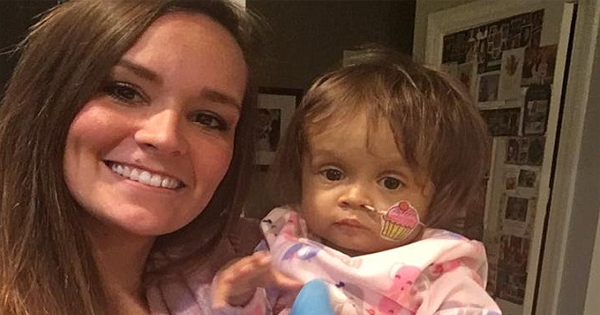Around May 2016, then-21-year-old college student, Kiersten Miles, began to work as a babysitter for the Rosko family in New Jersey. The Roskos had three young children in their home and needed Miles’ help taking care of them all, particularly since their youngest, nine-month-old Talia was ill.
In late 2015, when Talia was barely two months old, her doctor noticed something odd about the little girl’s eyes at her checkup. “Our pediatrician right away said her eyes were off,” father George Rosko recalled. “She said we have to go see a specialist immediately.”
It took one ultrasound and biopsy to test and confirm the terrible news: Talia was diagnosed with biliary artesia. This medical condition is one that develops in young children and prohibits the liver from properly disposing bile from the body. Once the bile builds up, it can cause liver failure.
Talia’s liver, at just two months of age, had already been completely destroyed.
In order for the little girl to survive, she would immediately have to undergo a procedure called Kasai, which would surgically remove the backed-up liver ducts and gallbladder and replace them with a small segment of the small intestines.
But this solution was only temporary. For Talia to make it past two years of age, she would have to undergo a full liver transplant.
Talia went onto the transplant list in June 2016, just a month after Miles had begun working for the Roskos.
When Miles heard the news about the sweet nine-year-old girl whom she’d fallen in love with, she knew she couldn’t just idly stand by. Without anyone’s asking, Miles went to the doctor to see if she matched with Talia.
She did.
That was when Miles went to the Rosko parents, Farra and George, to sit them down and tell them the news. She wanted to donate her liver to save Talia’s life.
“I was like, ‘Kiersten this is not like donating blood. This is serious,’” Farra remembered. “’You need to talk to your parents and you need to like do research.’”
Miles’ response was, simply, “I already did. I’m compatible.” She had even already gone to her parents to announce her decision. They were in full support.
There was nothing else to do but begin the extensive testing and paperwork to have Miles confirmed and onboard as Talia’s donor. Throughout this entire process, doctors warned Miles that this surgery would be life-changing, not just for Talia, but also for her.
If, in the future, one of Miles’ children needed a similar donation, she would no longer be able to offer her own liver.
Miles knew, and she’d already made up her mind. “It's such a small sacrifice when you compare it to saving a life,” she said. “All I had to do was be in the hospital for a week and a five-inch scar. I don't know, it just seemed like such a small sacrifice to me.”

On January 11, 2017, both Miles and Talia went into surgery. It was a 14-hour procedure, total. Doctors first removed part of Miles’ liver, and then transported it across the street to the hospital where Talia was being treated.
The donated organ was transplanted into Talia’s body, and almost immediately, doctors could see the huge improvement it provided Talia’s health.
Thankfully, both girls recovered incredibly well following their respective procedures. Talia’s average hospital stay was meant to be 14 days, but she was discharged after just nine. For Miles, she was able to go home after just a week in the hospital and now has a 5-inch scar to show for her selfless act.
Both patients will still have a while to go before they will return to being their fully functional selves, but Miles is hopeful about the recovery period because she will be able to spend it with Talia, knowing the little girl is in much better health than she was before.
When others tell Miles that she’s a hero and commend her for her generosity, she feels uncomfortable and shies away from it. To her, offering to donate her liver had simply seemed like the only thing to do.
“[Talia] was 9 months old when I started watching her. She’s so helpless. She can’t tell anyone what’s wrong with her. She can’t spread the word and ask for help," Miles explained. Whereas for Miles, at least she can now encourage others to put themselves on the organ donor list and potentially save someone’s life.
You can watch an interview of Miles here:





